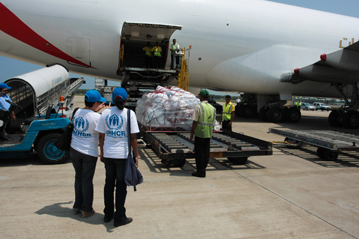A deadly sailing season begins: smuggling people from Somalia to Yemen
A deadly sailing season begins: smuggling people from Somalia to Yemen

BIR ALI, Yemen, September 7 (UNHCR) - The deadly business of smuggling people across the Gulf of Aden from Somalia to Yemen has resumed for another year, with four overcrowded open fishing boats arriving in less than a week.
Survivors on the first boat said four people died when the crew forced them overboard while still far from shore - the first of what will almost certainly be hundreds of deaths during the September to April period when sailing is possible.
"Though the sea is still rough, the sailing season has started. Hundreds of people, looking for refuge or for better economic conditions, are believed to be lost at sea every year when they are exploited by smuggling rings," said Adel Jasmin, representative of the UN refugee agency in Yemen.
The four boats, which started arriving from last Saturday, were carrying 363 passengers, in addition to the four who drowned. If it follows the pattern of previous years, a boat carrying about 100 people is likely to arrive every day.
"Most of those interviewed by UNHCR said they were leaving Somalia because of the continuous state of insecurity, drought and economic hardship," said Jasmin. "They reported they had no water or food on board and their treatment by the crew was, as usual, inhuman.
"The survivors said the crew beat the passengers. They also forced them out of the boat last Saturday while still in deep water, causing the deaths of four. Only two bodies were recovered and they were buried, nameless, at the coast," said Jasmin.
The smugglers are operating from the commercial port of Bossasso in Puntland, a self-declared autonomous area of north-east Somalia, more than 300 kilometres from Yemen. Most passengers are Somalis, but the boats also include large numbers of Ethiopians. UNHCR has interviewed some from as far away as Sri Lanka.
"The first group to arrive this season had waited for a week before the boat could take them from Bossasso to Yemen. And they said there are large groups waiting for their turn to cross," said Jasmin. "These survivors said there are three boats fully operational for now, running people between Puntland and Yemen."
The hazardous journeys are continuing despite UNHCR's repeated calls for international action to address the problem of smuggling and minimise the number of deaths. Hundreds have died before reaching shore in each of the three previous sailing seasons.
UNHCR has worked in the region to inform people about the dangers of using smugglers to cross the Gulf of Aden. Early this year UNHCR produced a video and radio programme to raise awareness of the risks.
High Commissioner for Refugees António Guterres has called for the international community to press local authorities in Puntland to crack down on smugglers. At the same time, UNHCR has called for donors to support international efforts to help internally displaced persons in Puntland, where very difficult living conditions encourage people to take desperate measures like risking their lives in a boat journey to Yemen.
UNHCR and the International Maritime Organisation have prepared a pamphlet to guide ship owners and captains, governments, insurance companies and other parties who could be involved in rescues of boatpeople such as those sailing to Yemen.
It provides guidance on the legal responsibilities and the practical steps to ensure the prompt disembarkation of those rescued and their specific needs, especially for refugees and asylum seekers.
The boat that arrived in Yemen last Saturday had 97 survivors aboard, 54 of them Somalis and the rest from Ethiopia. Two days later a second boat, with 87 passengers, arrived in Yemen - 85 Somalis and two Ethiopians. On Tuesday, two boats arrived with a total of 179 passengers, 111 from Ethiopia and the rest from Somalia. One of the women passengers gave birth right after arrival.
Yemen is one of the few countries in the region that has signed the 1951 Refugee Convention and it has been generous in receiving refugees. There are currently more than 88,000 registered refugees in Yemen, of which 84,000 are Somalis.
UNHCR operates a reception centre and camp in Yemen and checks to see if those arriving are asylum seekers or refugees whose status had been recognized earlier in other countries. Of the first arrivals this season, the overwhelming majority said they intended to leave Yemen to seek job opportunities in the richer Arab states of the Gulf.









